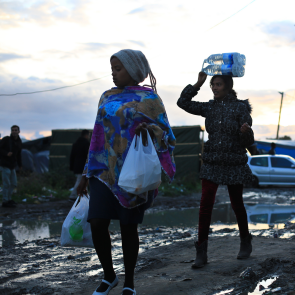Imagine bedding down every night sheltered from the wind and rain only by a ragged make-shift tent: having to sleep in groups in six in that tent, huddled together out of fear of being sexually assaulted during the night.
Imagine having to clean yourself using the same filthy toilets as thousands of others - dealing with menstruation, pregnancy, breastfeeding, and looking after young children; then queueing for hours for food.
Then there is the constant fear of violence, prostitution rings, smuggling gangs. All this while coming to terms with the unspeakable horrors of a journey across Europe: with more dangers of sexual violence, rape, prostitution and trafficking.
This is the everyday reality of the estimated 400 women living in ‘the Jungle’ refugee camp in Calais.
For all of the media attention these past few months on the refugees living in Calais, the story of these women has been ignored. We have become used to the images of the many young men who live in the camp, and who themselves have experienced traumas that we can barely comprehend, but the lives of the women living in the camp is far more onerous, far more treacherous.
READ MORE ANALYSIS ON THE REFUGEE CRISIS...
Caritas caught out by uncharted waters - Raymond Whitaker
Calais refugees are not wealthy, lucky or strong - Helen O'Brien
Greece braces itself for another wave of refugees - Sean Smith
On a recent visit to the camp as part of a Caritas Social Action Network (CSAN) delegation, I saw for myself the conditions in which these women are now being forced to exist. With space only for 80 in the Jules Ferry centre (a facility funded by the French government which, in addition to providing accommodation for 80 women and children also provides one hot meal per day, as well as some showers and toilets), most women in the camp are being left without any support.
Those who are unaccompanied by male family members huddle together in small clusters either within cultural or national groups or in small encampments, like the one behind the temporary church.
In a camp where, we were told, a significant proportion of people have trauma-related mental health issues, no psychological support is available aside access to one psychiatrist once every month.
 There are small clusters of safety in the Calais refugee camp, The Jungle, like a small encampment behind the Church (PA)
There are small clusters of safety in the Calais refugee camp, The Jungle, like a small encampment behind the Church (PA)
For women who have fled war, torture and persecution, or who may be the victims of sexual or physical violence, this is not sufficient.
Whilst there is a medical clinic in the camp run by Medicins du Monde, resources are limited and the incredible efforts of medical workers in the camp cannot mask the fact that women (some of whom have become pregnant since their arrival) are being left without the essential and particular medical support that they require.
The simple lack of drinking water causes kidney problems for many pregnant and nursing women. For this to be the situation for women in Europe in 2016 is as shocking as it is shameful.
For the women I met and saw in Calais, life in ‘the Jungle’ is unsustainable. Without access to the most basic amenities, without the most basic support which they require, and stuck in a transitory, inhumane and dangerous existence on a patch of wasteland outside Calais, hope of a better life will soon fade.
At a recent protest held by women in the camp, a sign read: “The Jungle is not for us. The Jungle is for animals.”
 As well as having to deal with the authorities the women are also vulnerable because the camps are mostly inhabited by young men (PA)
As well as having to deal with the authorities the women are also vulnerable because the camps are mostly inhabited by young men (PA)
It was right – we cannot allow 4,000 human beings to languish any longer in the conditions that I witnessed.
We, as a church and as a country, have a responsibility to help and support these people to re-build their lives.
This doesn’t stop at the emergency response of providing better shelters and more humane conditions, but also includes developing a long-term political solution to their plight.
Our reputation as a moral and just nation depends on it.
Sister Lynda Dearlove is director of Women at the Well and a Caritas Social Action Network Trustee (CSAN) who was a part of a CSAN delegation that visited Calais in recent weeks
KEEP UP TO DATE ON TWITTER...
Follow all the latest news and events from the Catholic world via The Tablet's Twitter feed @the_tablet




 Loading ...
Loading ...
What do you think?
You can post as a subscriber user ...
User comments (0)